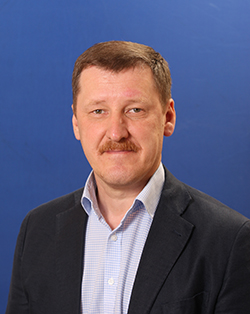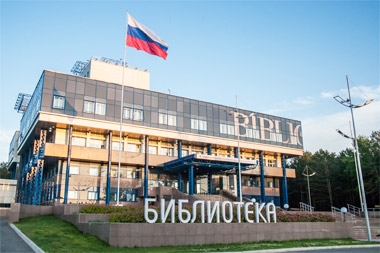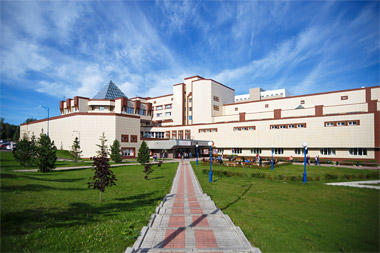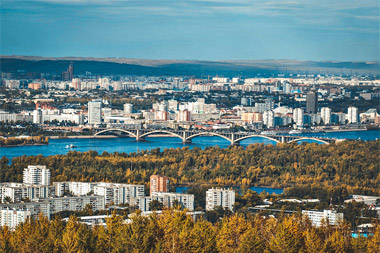The Master's Program "Digital Intelligent Control Systems" is offered by the School of Space and Information Technologies of the Siberian Federal University. The Program provides training in developing embedded intelligent control systems based on modern microprocessors, microcontrollers and programmable integrated circuits (FPGA, PLD, SoC). During the training, students receive skills that allow graduates to perform the full cycle of developing intelligent embedded control systems at a high professional level.
The aim
The master's program "Digital Intelligent Control Systems" is aimed at teaching students methods of developing control systems using modern electronic components and artificial intelligence technologies.
Objectives
- acquaint students with the basic concepts and terminology in the field of digital intelligent control systems;
- introduce students to modern approaches to developing intelligent control systems based on neural networks, genetic algorithms, intelligent agents, ets.;
- provide insight into modern FPGA architecture and FPGA-based design flow, including testing, simulation and verification.
- teach students to use hardware description language and computer aided tools for designing FPGA/PLD-based digital control units;
- familiarize students with principles of organizing data exchange between the microcontroller and memory, sensors, peripheral devices using standard interfaces, serial and parallel data exchange;
- provide an opportunity to apply the knowledge and skills acquired in the framework of separate disciplines, in a package during the implementation of the Final project;
- give students theoretical knowledge and practical experience in project management, language skills in professional communications, and other soft skills contributing to successful labor market promotion.
Learning outcomes (knowledge, skills, competence)
Upon completion of this module, it is expected that students will be able to:
- design, verify, and test software/hardware intelligent control systems using system-design platform LabView (© National Instruments) ;
- develop embedded intelligent control systems for executive automation based on microprocessors and microcontrollers;
- develop software for embedded systems in C and assembler;
- build effective FPGA/PLD designs using Hardware Description Language Verilog (or VHDL) and professional CAD Quartus (© Intel);
- implement circuit solutions for the interfacing of intelligent
- digital systems with sensor systems and executive automation.
Relevant links
 Facebook: facebook.com/StudySibFU
Facebook: facebook.com/StudySibFU Skype: StudyatSibFU
Skype: StudyatSibFU VKontakte: vk.com/international_education_sibfu
VKontakte: vk.com/international_education_sibfu
Program News
12/06/2021 Summing up
Our Master program started this academic year. The preliminary results of the interview revealed the significant interest of international students in the master's program. 9 candidates out of 12 wishing to undergo training were approved. Unfortunately, most of them were unable to enroll in the program due to the epidemiological situation to covid-19. For the same reason, at the initial stages, training under the program was carried out in a distance format. However, we were able to resolve all organizational issues. The students received laboratory and control equipment for personal use. This made it possible to carry out practical and laboratory work at home. Also, we organized additional meetings to clarify the most important issues in person.
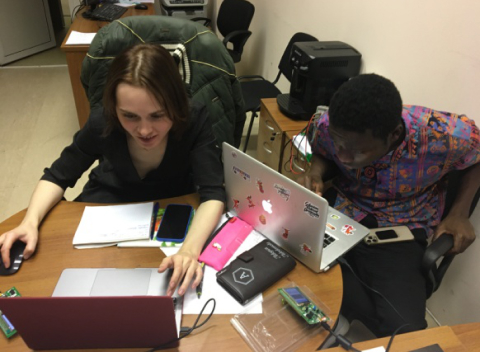
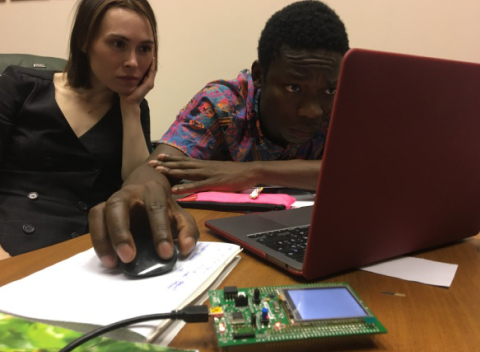
Together we decided to apply a new principle of lecturing. Each lecture is "turned" into a lesson consisting of theoretical material online, theoretical material located in electronic courses, test questions and practical work performed by the student at home. We also organized extracurricular activities in the group. This approach allowed us to successfully complete all the work. Moreover, we have launched a unique project on remote access to laboratory equipment and in the next semester we will continue to work on it together. The first result was the implementation of drivers for control of indication, executive equipment and communication modules. Adegun Adedamola developed an analogue of the Lexus light indication control device, and Elena Gushchina presented a control controller based on a System-un-a-Chip by STM Microelectronics. Students are planning to use the results of their research in final qualifying works. According to the results of the first semester, students prepared three articles for conferences. Now we are working as part of the student design bureau on the assembly of the first "remote" robot and we are preparing to speak at the XXVIII International Scientific and Practical Conference EUROPEAN SCIENTIFIC CONFERENCE.


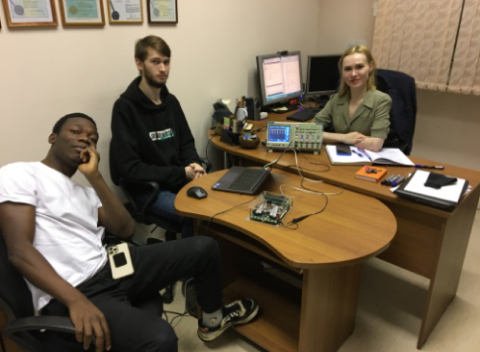
Why choose this program?
The expansion of the scope of intelligent digital control systems is one of the main trends in computer technology. Subject matter experts are in demand in the labor market, but their training requires complex technical equipment found within the educational process, as well as the professional and practical experience of the teaching staff. All these conditions are available to the participants of this Master Program. Formed skills cover the full cycle of intelligent control system development.
Core disciplines of the Program are developed or updated in the framework of the international project “Applied curricula in space exploration and intelligent robotic systems (APPLE) (2016-2020)”.
Our international partners are:
- Technische Universität Berlin, Germany;
- Sorbonne Université - Université Pierre et Marie Curie, Paris, France;
- Institute Thomas More Antwerp, Belgium;
- Technological University Lulea, Sweden;
- Riga Technical University, Latvia;
- Tallinn University of Technology, Estonia;
- Belarusian State University, Minsk, Belarus;
- Belarusian National Technical University, Minsk, Belarus;
- Belarusian State University of Informatics and Radioelectronics, Minsk, Belarus;
- Al-Farabi Kazakh National University, Astana, Kazakhstan;
- Almaty University of Power Engineering and Telecommunication, Kazakhstan.
Career prospects
Research career: The Master’s degree holder can continue studying to earn a PhD SibFU degree
Teaching Methods
The Program focuses on practical skills in developing industrial purpose control systems, generating a "ready solutions" kit for future use in professional activities.
The practical result of learning is an embedded intelligent digital control system of executive automation, implemented in the framework of the Final Project.
Practical classes are held both individually and in groups to simulate teamwork.
Mastering the Program is possible in the blended learning mode.
All lecture material and some laboratory works are available remotely.
Facilities, Equipment and Software
Training is conducted in specially outfitted laboratories with personal workstations equipped with a high-performance PC, control equipment, a set of sensors and actuators, evaluation boards etc.
Students will use such integrated development environments as ©NI LabView, ©Atmel AVR Tools, ©Xilinx Vivado DS, ©Intel Quartus, © MathWorks MathLab.
Technical support of the educational process is based on the following specialized laboratories:
- ROBOLAB, implemented within the framework of the Erasmus+ project "Applied curricula in space exploration and intelligent robotic systems - APPLE",
- Microprocessor Systems,
- Networks and Telecommunications,
- Center of High-Performance Computing.
- Industrial partners and potential employers, providing a base for internship, are leading regional and Russian enterprises.
| Fields of Study |
|
|---|---|
| Duration | 2 years |
| Study intensity | Full-time |
| Delivery mode | On campus |
| Type of degree | M.Sc. |
| Credits | 120 ECTS credits |
| Language of instruction | English |
| Academic requirements |
|
| Tuition fee (per year) | 260,000 rubles The cost does not include accommodation and living expenses. The price could change at the time of signing a learning agreement. |
| Application deadline | July 29th |
| Accommodation | On-campus accommodation is available in double and triple-occupancy rooms (€ 20 per month) |
| Practicalities | Airport transfer and invitation letter for a Russian study visa are provided by the University |
Oleg V. Nepomnyashciy
Ph.D. in Engineering, Professor, Head of Computer Science department, ISIT SibFU.
e-mail: ONepomnuashy@sfu-kras.ru
CV in English (.pdf)
Google Scholar: https://scholar.google.com/citation...
Profile on another site: http://vt.ikit.sfu-kras.ru/people/N...
Area of expertise:
- High-level design of VLSI circuit;
- Microprocessor systems;
- Measurement systems;
- CAD tools for VLSI and Systems on Chip design.
Coordinator and participant of Funded Projects:
- Local work group coordinator for the project “Applied curricula in space exploration and intelligent robotic systems (APPLE)” supported by EACEA grant 573545-EPP-1-2016-1-DE-EPPKA2-CBHE-JP.
- Development of a multifunctional on-board control complex for the small spacecraft using a radiation-resistant element base of the Russian production of the system-on-chip class (2014-2016).
- Development of the VLSI Class Architecture System-on-a-Chip for Creating a Goniometric Navigation Receiver (2015-2017).
- Creation of high-tech production of modern angular satellite navigation equipment based on the Russian microelectronic components of the system-on-chip class (2016-2017).
- Development and debugging of a hardware-software simulator of an spacecraft onboard control complex (2017-2020).
Recent articles and papers in peer-reviewed journals:
- Nepomnyashchiy O.V., Ryjenko I.V., Shaydurov V.V., Sirotinina N.Y., Postnikov A.I. The VLSI high-level synthesis for building onboard spacecraft control systems. Proceedings of the Scientific-Practical Conference "Research and Development - 2016" Springer International Publishing AG Cham, Switzerland 2017 р.737.
- Oleg V. Nepomnyashchiy, Yuri V. Krasnobaev, Aleksey P. Yablonsky, Vyacheslav V. Potekhin, Natalia J. Sirotinina. Ensuring minimum duration of transient processes in switched voltage regulators with digital control. EAI Endorsed Transactions on Energy Web and Information Technologies. №.19(24): e6. EAI Endorsed Transactions. 2019. doi: 10.4108/eai.16-10-2019.160838
- O. V. Nepomnyashchiy , I.N. Ryzhenko, A.E. Lutsenko, O.G. Varygin. Carrier compensation mode implementation in satellite communication channels. IEEE: 2019 International Siberian Conference on Control and Communications (SIBCON). Tomsk, 2019, DOI: 10.1109/SIBCON.2019.8729665
- Oleg Nepomnyashchy, Alexandr Legalov, Valery Tyapkin, Igor Ryzhenko, Vladimir Shaydurov. Methods and algorithms for a high-level synthesis of the very-large-scale integration. WSEAS Transactions on Computers ISSN / E-ISSN: 1109-2750 / 2224-2872, Volume 15, 2016, Art. #22, pp. 239-247
- Nepomnyashchy O.V., Legalov A.I., Sirotinina N.J. The VLSI high-level synthesis for building onboard spacecraft control systems Proceedings of the Scientific-Practical Conference "Research and Development - 2016". Springer International Publishing AG, Cham, Switzerland, 2017. p.p.229-238 p.
- Nepomnyashchy OV, Krasnobaev Yu.V., Ivanchura V.I., Pozharkova I.N., Yablonsky A.P. Pulse voltage regulator with a digital control system for an autonomous power supply system. Bulletin of Tomsk Polytechnic University. Georesource engineering [in-Russian]. 2018. Volume 329, No. 11. P. 61 - 73.
- Nepomnyashchiy O., Goreva V. Dynamically reconfigurable single-chip computing modules in digital control circuits for space vehicles. Anthology of scientific research papers “Space Engineering, Technologies & Exploration”. ECM Space Technologies GmbH, Berlin, Germany, 2018. p.p.176-181.
Study Plan
| 1 semester | 29 ECTS credits |
|---|---|
| Master's courses | 26 ECTS credits |
| Electronical Engineering | 8 ECTS credits |
| Mesurement and Testing | 7 ECTS credits |
| Sensors and Visual Systems | 5 ECTS credits |
| Microcontrollers and Systems-on-Chip | 3 ECTS credits |
| Language skills | 3 ECTS credits |
| Research seminar | 3 ECTS credits |
| 2 semester | 30 ECTS credits |
| Master's courses | 22 ECTS credits |
| Microcontrollers and Systems-on-Chip (Part II) | 6 ECTS credits |
| C Programming for Embedded Software | 6 ECTS credits |
| Digital System Design | 4 ECTS credits |
| Digital Signal Processing | 3 ECTS credits |
| Professional Communication | 3 ECTS credits |
| Research seminar | 5 ECTS credits |
| Internship | 3 ECTS credits |
| 3 semester | 30 ECTS credits |
|---|---|
| Master's courses | 27 ECTS credits |
| Digital System Design (Part II) | 4 ECTS credits |
| Digital Signal Processing (Part II) | 5 ECTS credits |
| Intelligent Systems and Neural Networks | 6 ECTS credits |
| Internet of Things | 3 ECTS credits |
| Research Project Management | 3 ECTS credits |
| Elective courses | 6 ECTS credits |
| Wireless and Sensor Networks | 3 |
| Optimization of Computer Networks | |
| Wireless and Sensor Networks | 3 |
| Real-time Operating Systems | |
| Research Project | 3 ECTS credits |
| 4 semester | 31 ECTS credits |
| Externship | 9 ECTS credits |
| Final Project | 12 ECTS credits |
| Final certification | 10 ECTS credits |
| TOTAL | 120 ECTS credits |
Oleg V. Nepomnyashchiy
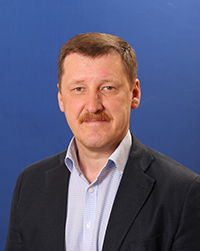
Current Position: Professor, Head of the Department of Computer Science, School of Space and Information Technologies.
Research Interests: High-level design of VLSI circuit, Microprocessor systems, Measurement systems, CAD tools for VLSI and Systems on a Chip design.
E-mail: ONepomnuashy@sfu-kras.ru
Google Scholar: scholar.google.com
Personal webpage: structure.sfu-kras.ru
Profile on another site(s): vt.ikit.sfu-kras.ru, Scopus, Elibrary,
ORCID
CV (.pdf)
Natalia J. Sirotinina
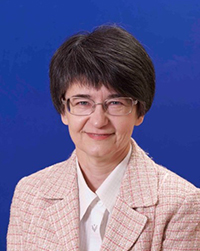
Current Position: Associate Professor, Computer Science Dept., Head of Laboratory in Microprocessor Systems, School of Space and Information Technologies.
Research Interests: Neurocomputing, Architectures of parallel high-performance computing systems, Parallel programming, CAD tools for VLSI and Systems on a Chip design
E-mail: nsirotinina@sfu-kras.ru
Google Scholar: scholar.google.com
Personal webpage: structure.sfu-kras.ru
Profile on another site(s): vt.ikit.sfu-kras.ru, Scopus, Elibrary,
ORCID
CV (.pdf)
Maksim S. Medvedev
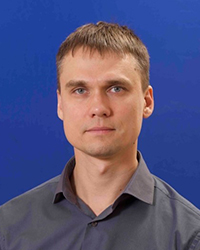
Current Position: Associate Professor of Computer Science Dept, School of Space and Information Technologies.
Research Interests: Digital signal processing, Physical fundamentals of data transmission and digital signal processing, Internet technologies, Digital electronics.
E-mail: mmedvedev@sfu-kras.ru
Google Scholar: scholar.google.com
Personal webpage: structure.sfu-kras.ru
Profile on another site(s): vt.ikit.sfu-kras.ru, Scopus, Elibrary,
ORCID
Tatiana N. Yamskikh

Current Position: Associated Professor at School of Space and Information Technologies.
Research Interests: Distance learning, English as a foreign language.
E-mail: TYamskikh@sfu-kras.ru
Google Scholar: scholar.google.com
Personal webpage: structure.sfu-kras.ru
Profile on another site(s): vt.ikit.sfu-kras.ru, Scopus, Elibrary,
ORCID
Dmitry A. Schwetz
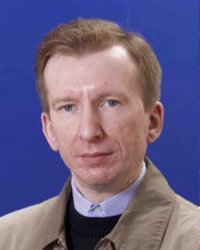
Current Position: Associate Professor of Computer Science Dept, School of Space and Information Technologies.
Research Interests: Open technology software development, Development of graphical user interfaces, Methodological aspects of software development, Mobile systems software, Translators, Software development for mobile and embedded systems.
E-mail:DSchwetz@sfu-kras.ru
Google Scholar: scholar.google.com
Personal webpage: structure.sfu-kras.ru
Profile on another site(s): vt.ikit.sfu-kras.ru, Elibrary
Dmitriy A. Nedorezov
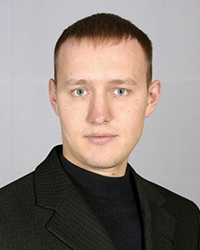
Current Position: Associate Professor of Computer Science Dept, School of Space and Information Technologies.
Research Interests: Design of automated control systems for technological processes. Мeasuring and control systems. CAD of test complexes.
E-mail: dnedorezov@sfu-kras.ru
Google Scholar: scholar.google.com
Personal webpage: structure.sfu-kras.ru
Profile on another site(s): Elibrary
Kirill V. Korshun
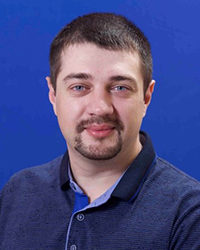
Current Position: Associate Professor of Computer Science Dept, School of Space and Information Technologies.
Research Interests: Network OS and Network Administration, Wireless networks, Networks and telecommunications,
Fundamentals of information security in computer networks, Design and deployment of computer networks,
Internet routing and transmission protocols.
E-mail: KKorshun@sfu-kras.ru
Google Scholar: scholar.google.com
Personal webpage: structure.sfu-kras.ru
Profile on another site(s): vt.ikit.sfu-kras.ru, Scopus, Elibrary
More information?
Please contact our Department of International Educational Programs, SibFU
e-mail: study [at] sfu-kras [dot] ru
phone: +7 391 206-39-28
fax: +7 391 206-21-66
address: 82/6 Svobodny pr., room 427, Krasnoyarsk, 660041 Russia
 VKontakte: vk.com/international_education_sibfu
VKontakte: vk.com/international_education_sibfu
Ask a question
The University
Today Siberian Federal University (SibFU) with over 35,000 students enrolled in its programmes is one of the most actively developing universities in Russia. Annually more than 200 visiting professors — leading scientists from UK, Germany, Spain and USA — deliver their lectures at SibFU.
The University is a winner of the Russian Government grants supporting research projects under the guidance of top-level scholars from Russia and all over the world.
The campus of Siberian Federal University is located in a forested area of the city of Krasnoyarsk. Academic buildings and dormitories of the university are surrounded by natural forest lands and easily accessible by the public transport. More information about the University Campus can be found here.
The City of Krasnoyarsk
Krasnoyarsk is the administrative capital of Krasnoyarsky kray — second largest region of Russia. It is a big industrial and educational centre with a population of more than 1 million people, and also an important junction of the Trans-Siberian Railway.
The city is located on the banks of the Yenisey River in the valley formed by the Eastern Sayan Mountains. Nature reserve Stolby ("pillars") has become the city’s visiting card.
Among the famous people born in Krasnoyarsk are artist Vasily Surikov, opera singer Dmitri Hvorostovsky, biathlete Evgeny Ustyugov, skeletonist Alexander Tretyakov and ice-hockey player Alexander Semin.
In March 2019 Krasnoyarsk proudly hosted the

 Siberian Federal University
Siberian Federal University 
